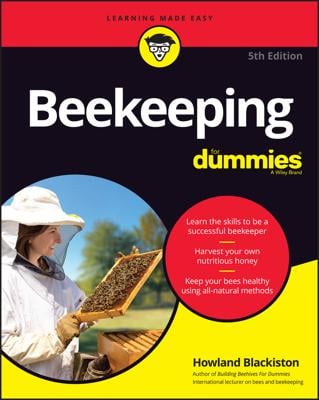Honey is by no means the only reason folks are attracted to beekeeping. For a long time, agriculture has recognized the value of pollination by bees. Without the bees’ help, many commercial crops would suffer serious consequences. Even backyard beekeepers witness dramatic improvements in their gardens’ yields: more and larger fruits, flowers, and vegetables.
A hive or two in the garden makes a big difference in your success as a gardener.
Harvesting honey from your beehives
The prospect of harvesting honey is certainly a strong attraction for new beekeepers. There’s something magical about bottling your own honey.
How much honey can you expect? The answer to that question varies depending on the weather, rainfall, and location and strength of your colony. But producing 60 to 80 pounds or more of surplus honey isn’t unusual for a single colony.
Recognizing the value of bees as pollinators
Any gardener recognizes the value of pollinating insects. Various insects perform an essential service in the production of seed and fruit. The survival of plants depends on pollination. Sixty percent of the fruits and vegetables we rely on to feed our families need honey bee pollination. The value of honey bee pollination to U.S. agriculture is more than $14 billion annually, according to a Cornell University study.
Saving the bees
The facts that keeping a hive in the backyard dramatically improves pollination and rewards you with a delicious honey harvest are by themselves good enough reasons to keep bees. But today, the value of keeping bees goes beyond the obvious. In many areas, millions of colonies of wild (or feral) honey bees have been wiped out by urbanization, pesticides, parasitic mites, and a recent phenomenon called Colony Collapse Disorder. Collectively, these challenges are devastating the honey bee population.
Getting a bee education
As a beekeeper you continually discover new things about nature, bees, and their remarkable social behavior. Just about any school, nature center, garden club, or youth organization loves for you (as a beekeeper) to share your knowledge. Spreading the word to others about the value these little creatures bring is great fun. You’re planting a seed for the next generation of beekeepers.
Improving your health: Bee therapies and stress relief
There’s something about being out there on a lovely warm day, the intense focus of exploring the wonders of the hive, and hearing that gentle hum of contented bees that reduces stress.
Any health food store proprietor can tell you the benefits of the bees’ products. Honey, pollen, royal jelly, and propolis have been a part of healthful remedies for centuries. Honey and propolis have significant antibacterial qualities. Royal jelly is loaded with B vitamins and is widely used overseas as a dietary and fertility stimulant. Pollen is high in protein and can be used as a homeopathic remedy for seasonal pollen allergies.
Apitherapy is the use of bee products for treating health disorders. Even the bees’ venom plays an important role here — in bee-sting therapy. Venom is administered with success to patients who suffer from arthritis and other inflammatory/medical conditions. This field of study and treatement has become a science in itself and has been practiced for thousands of years in Asia, Africa, and Europe.

